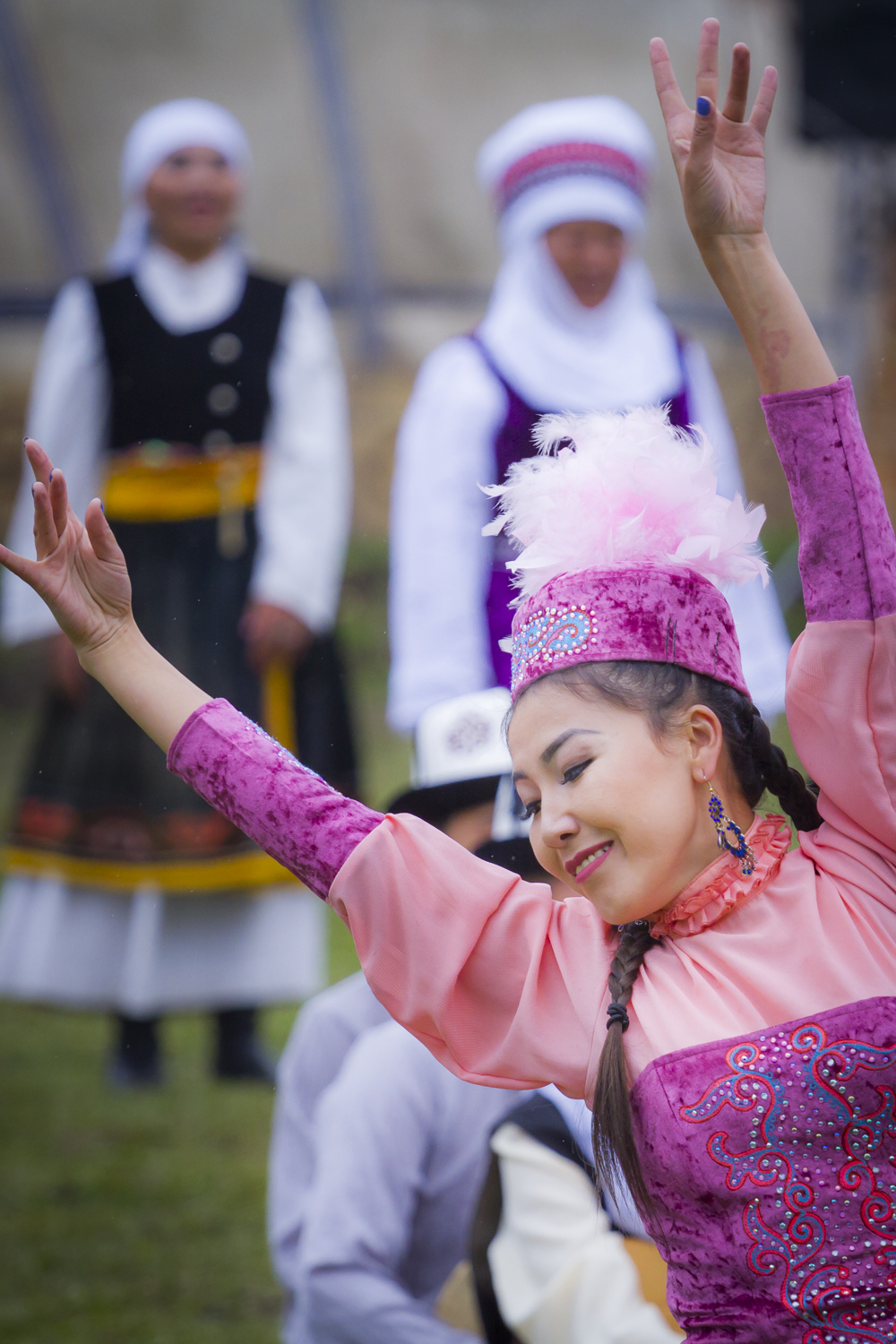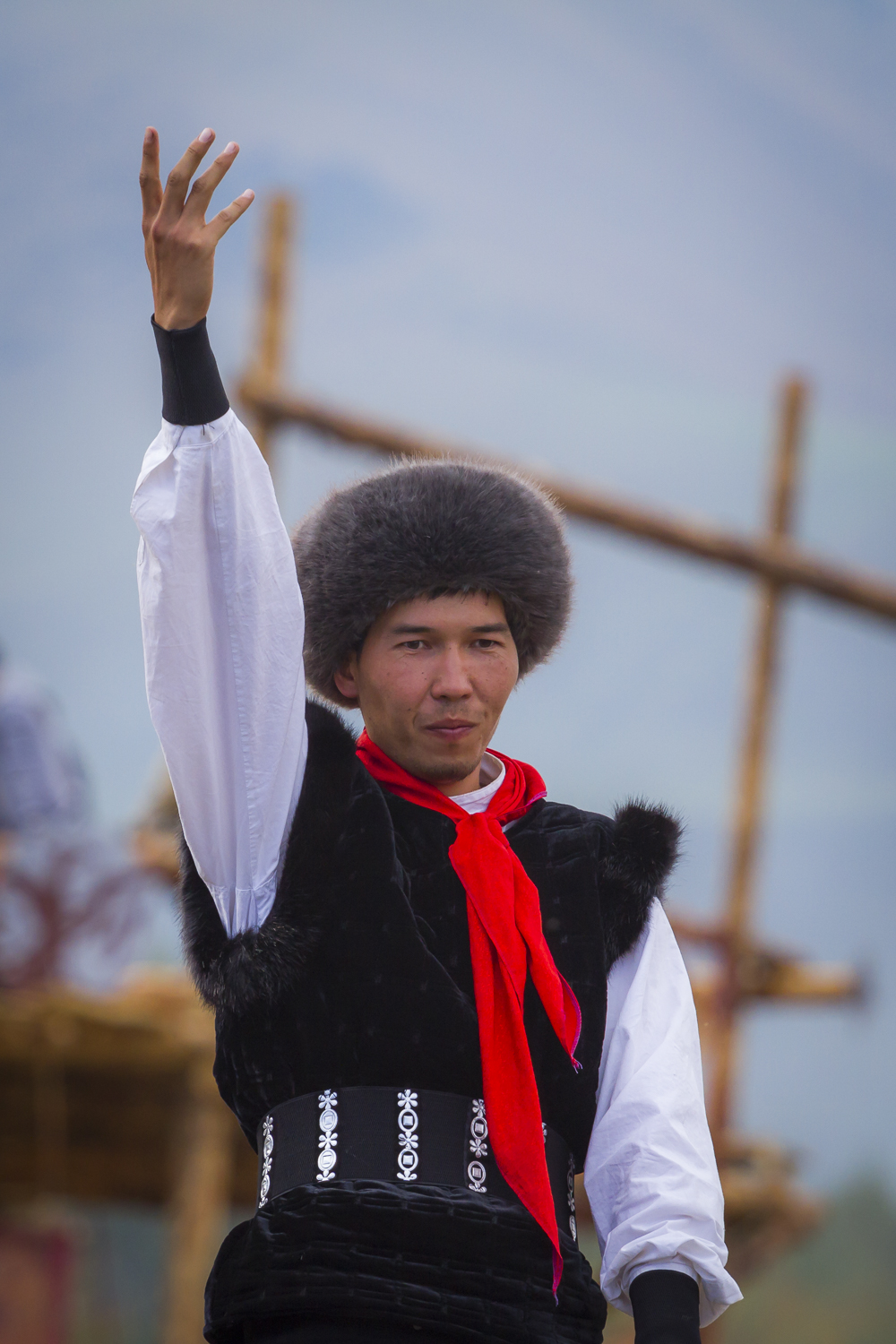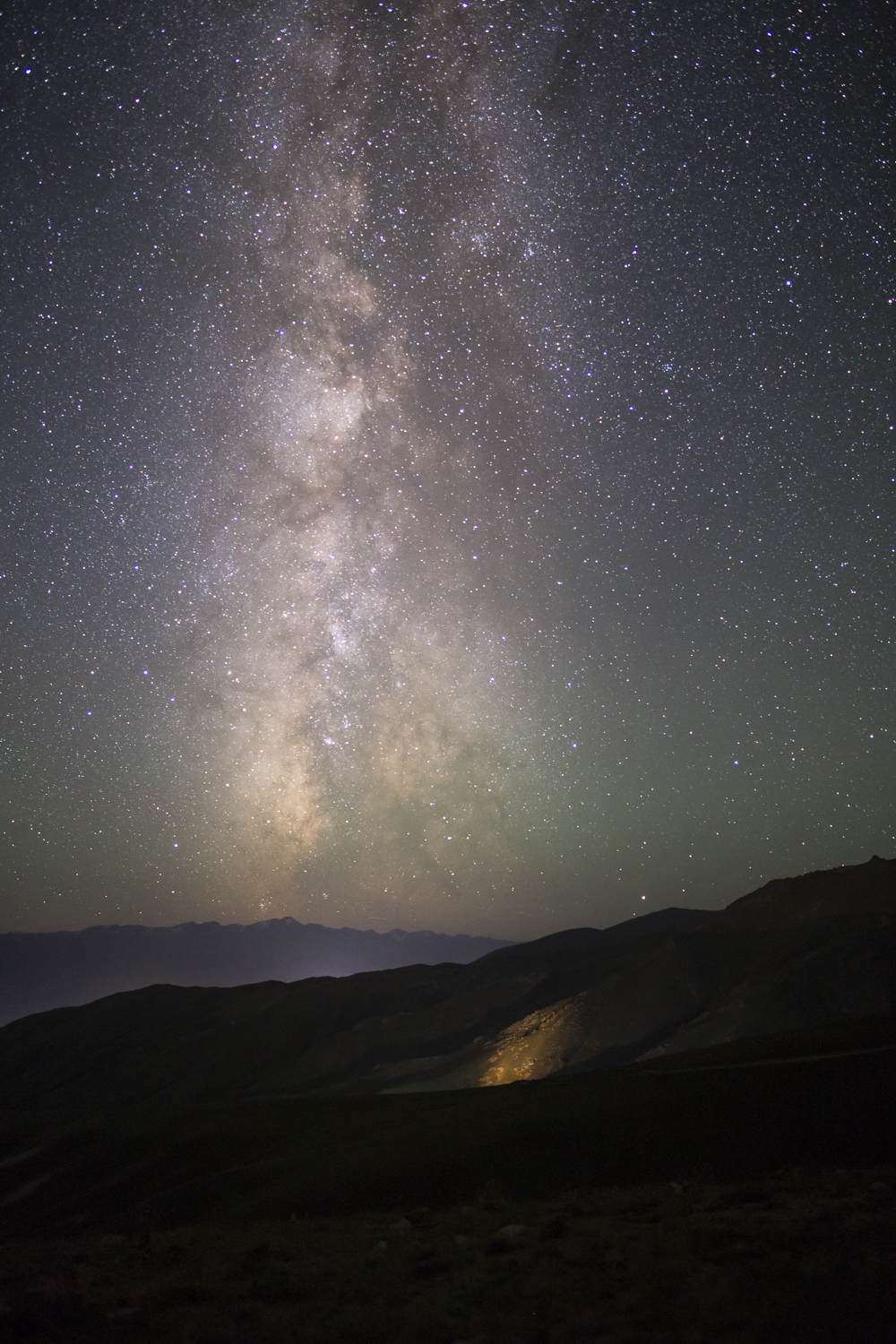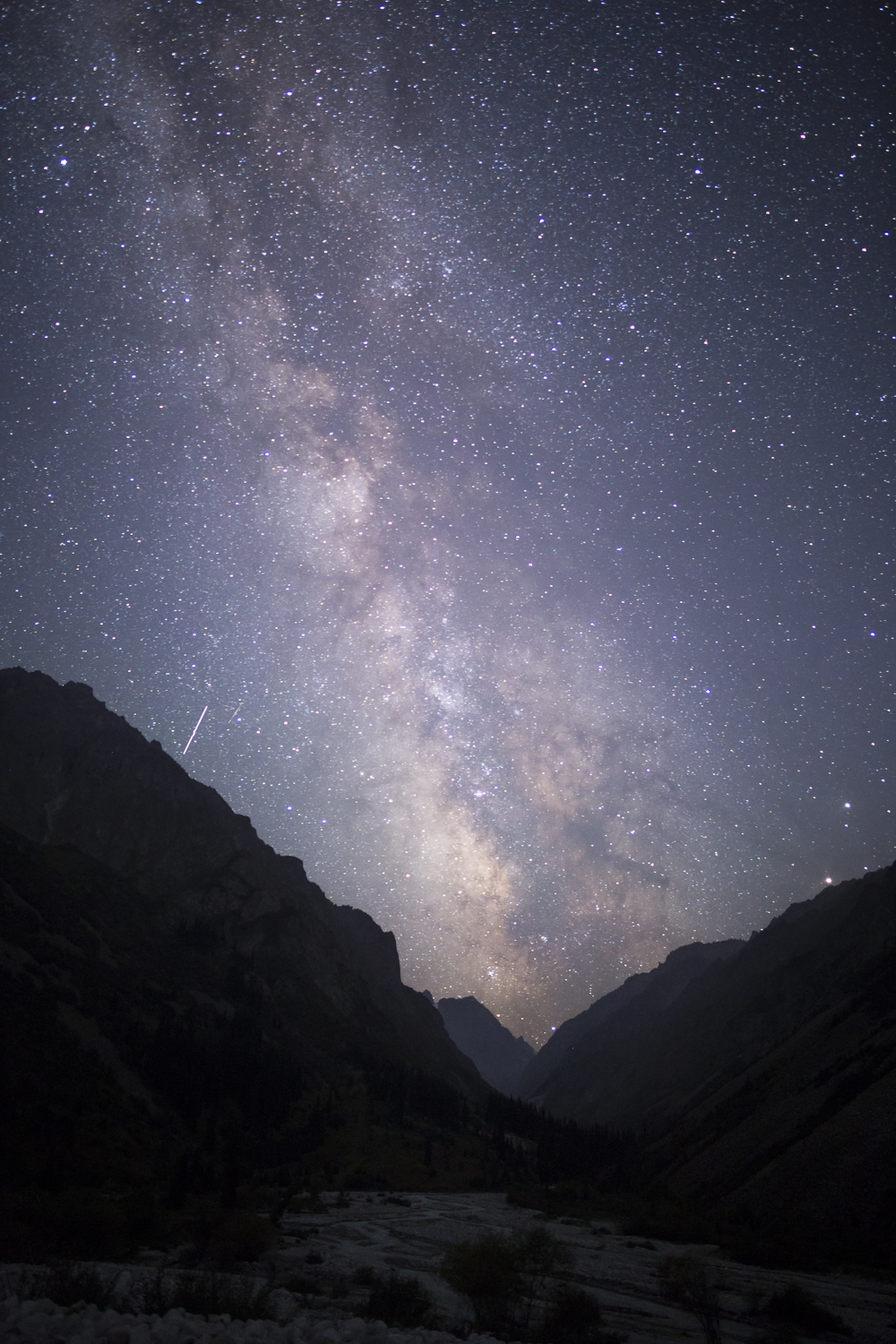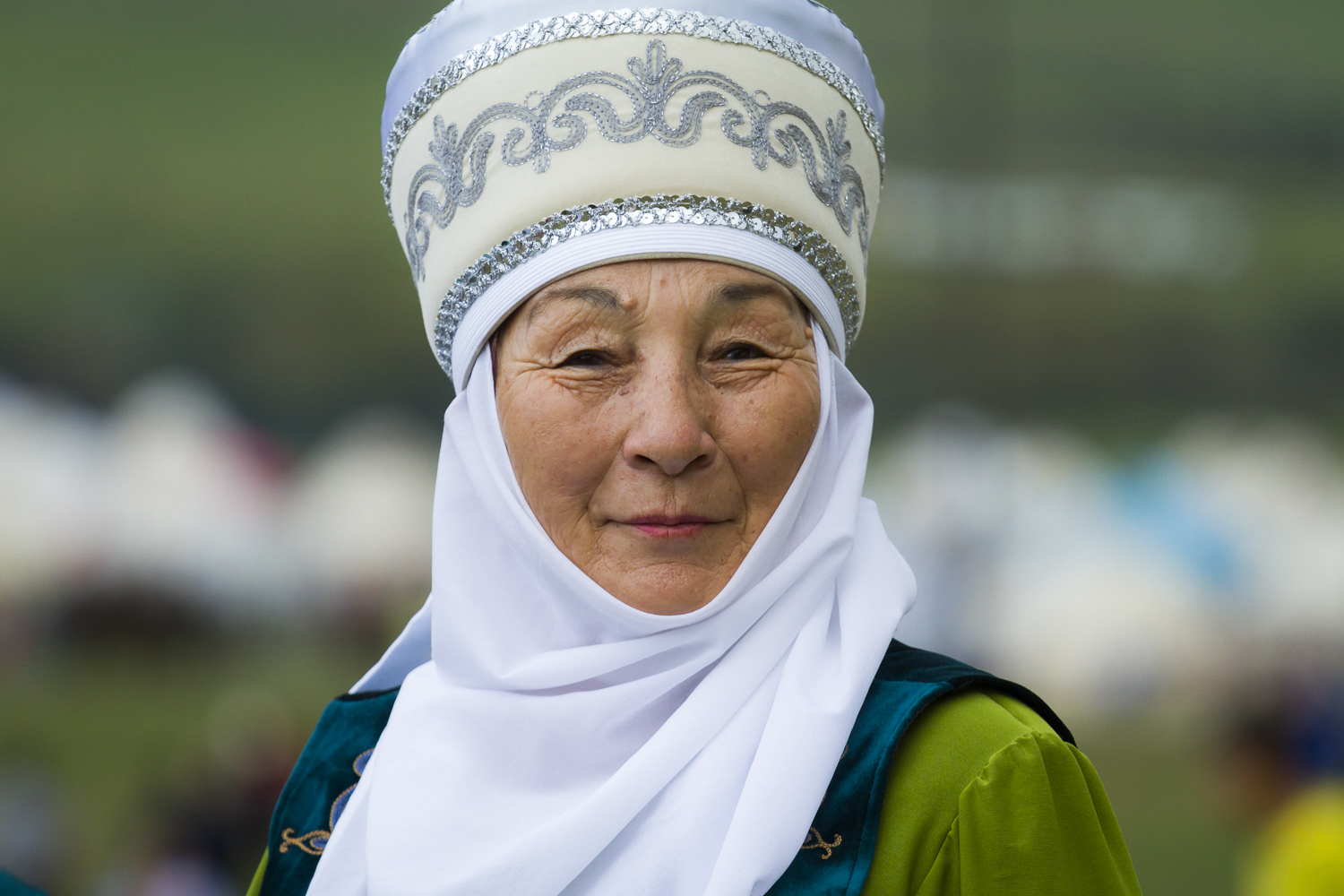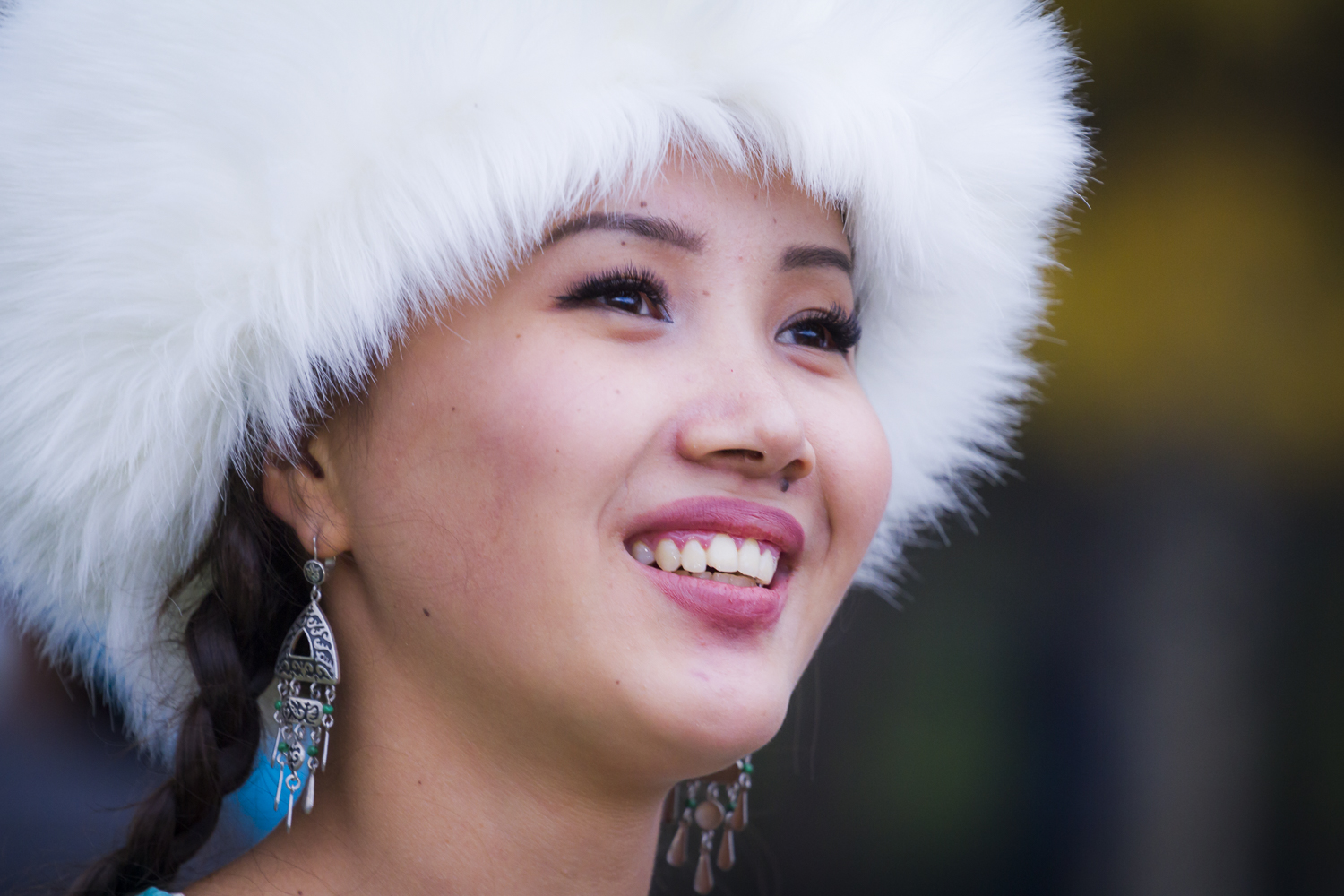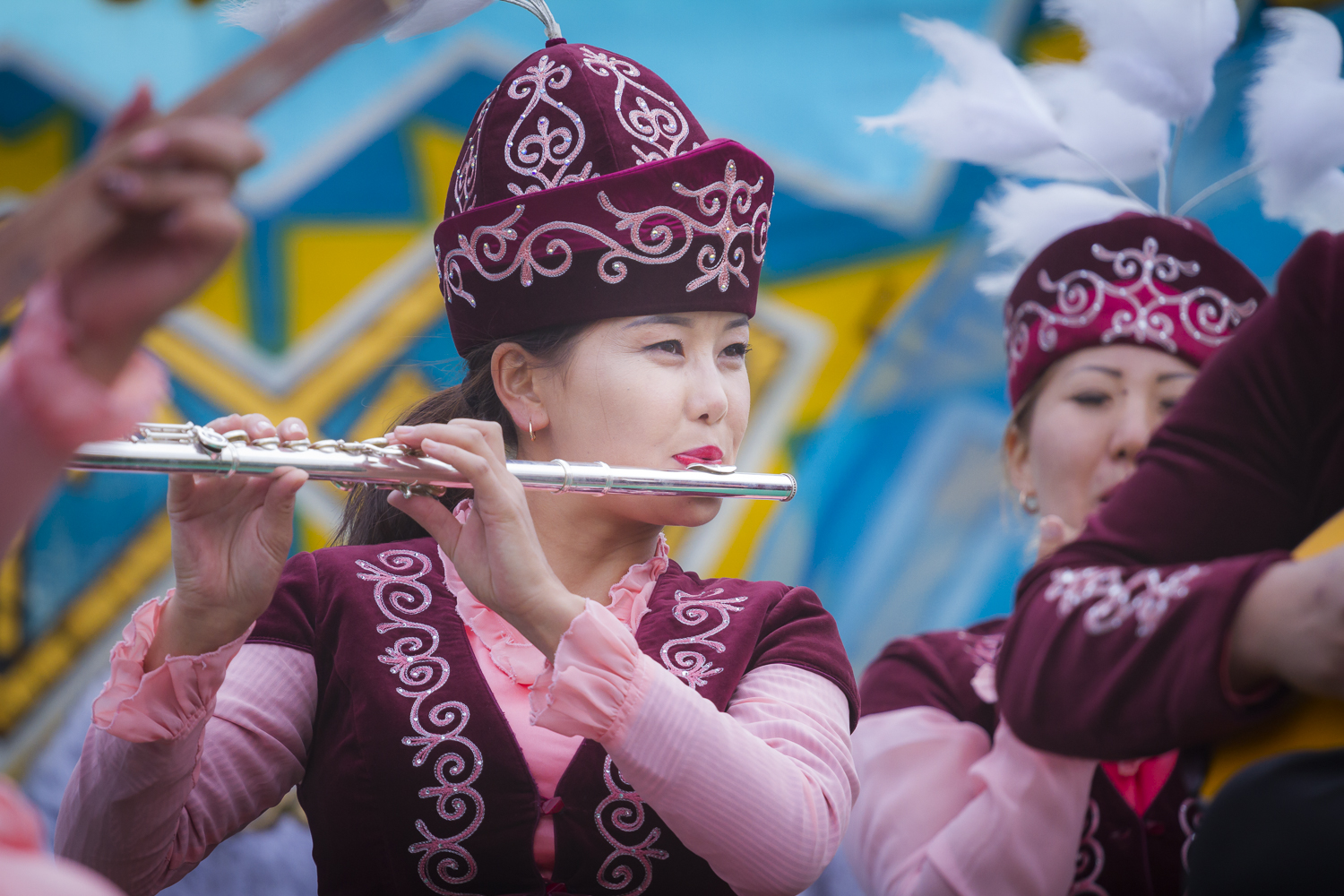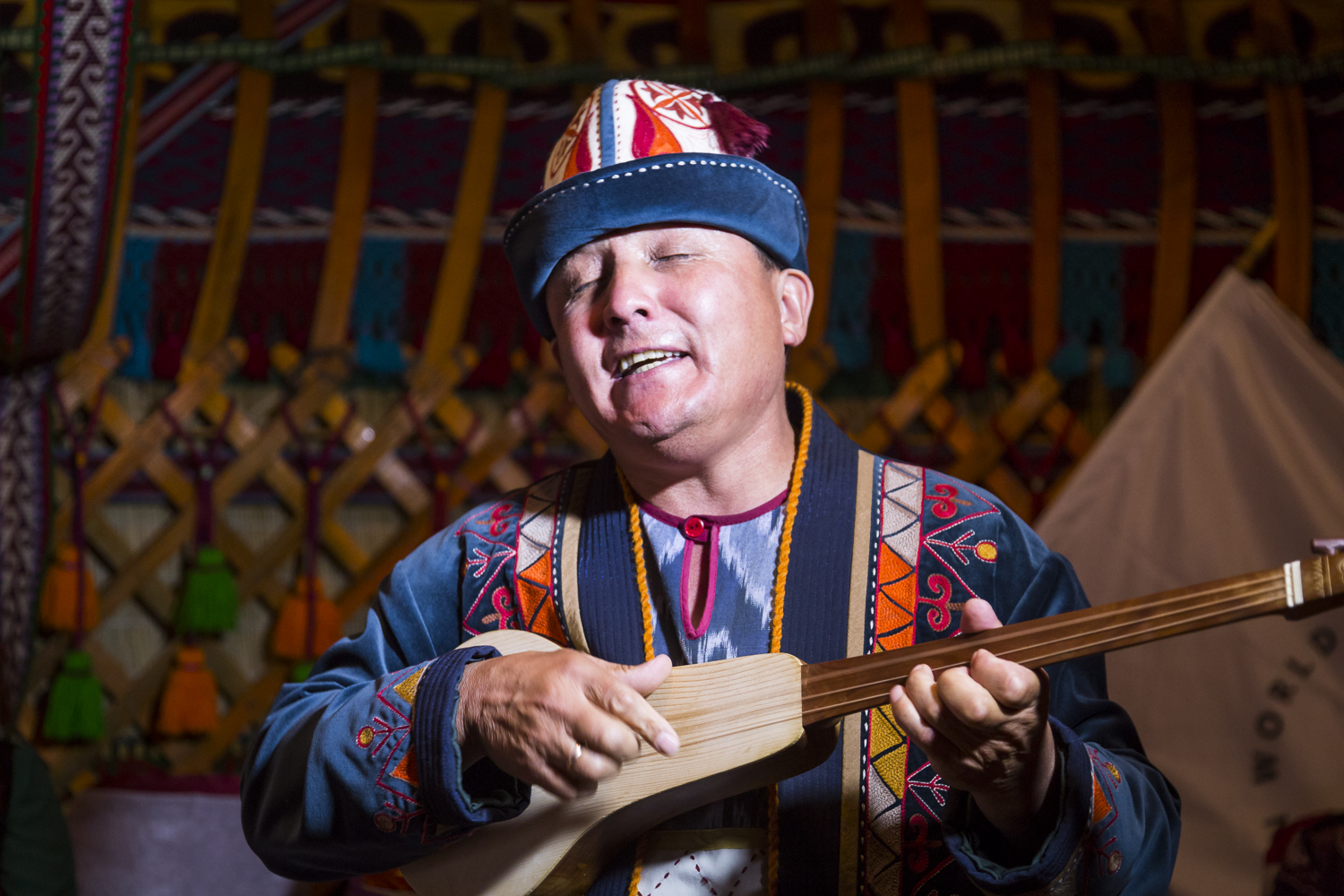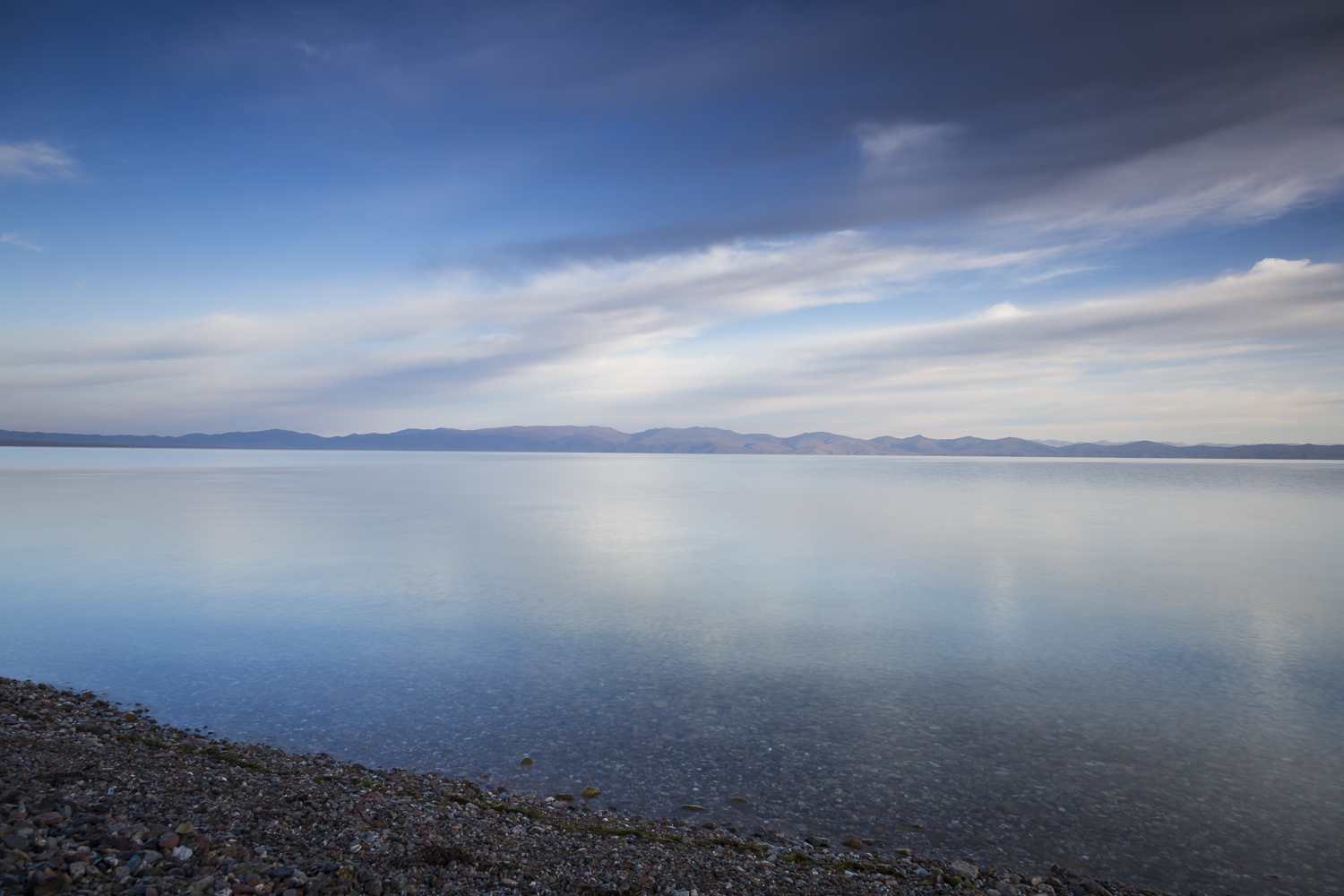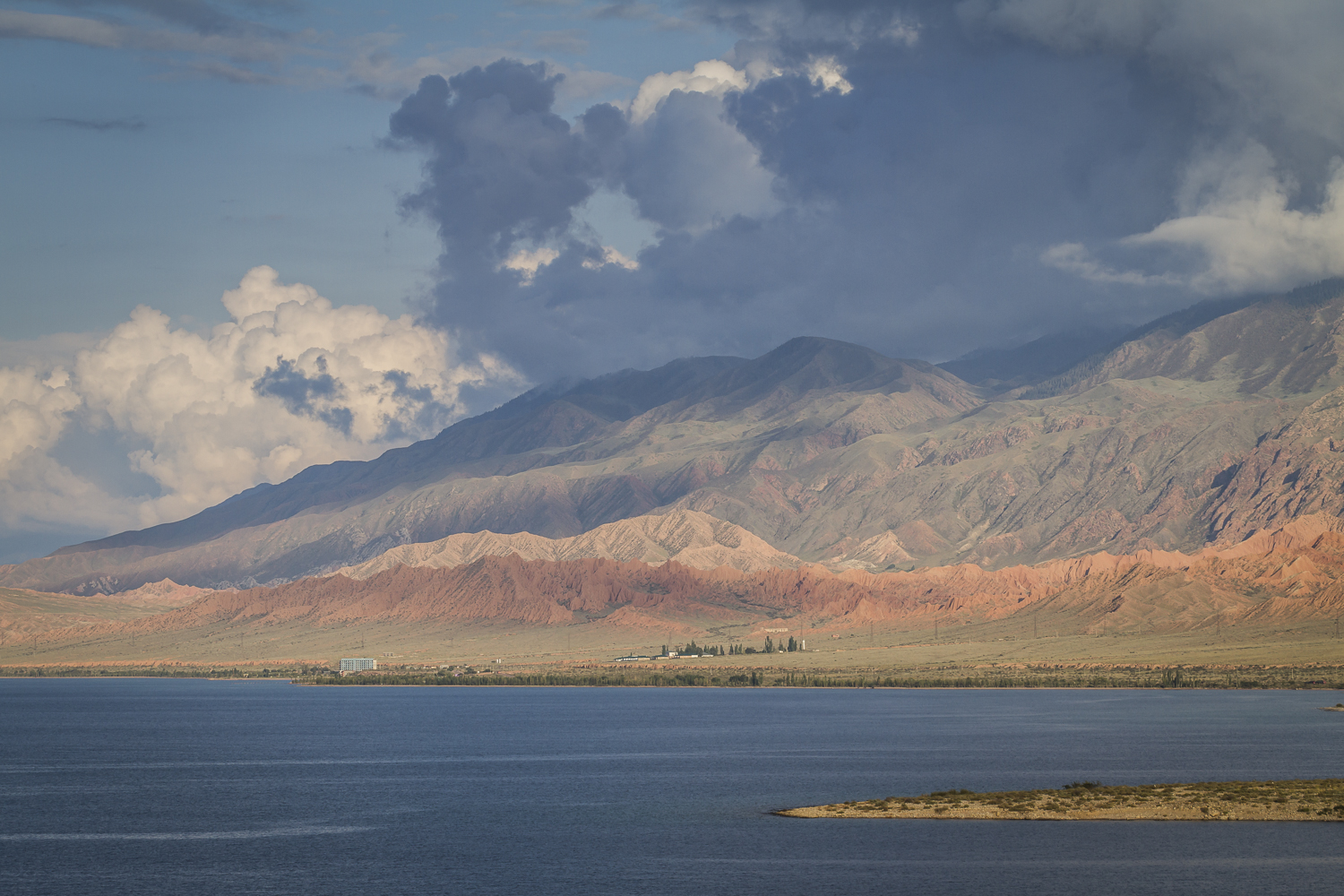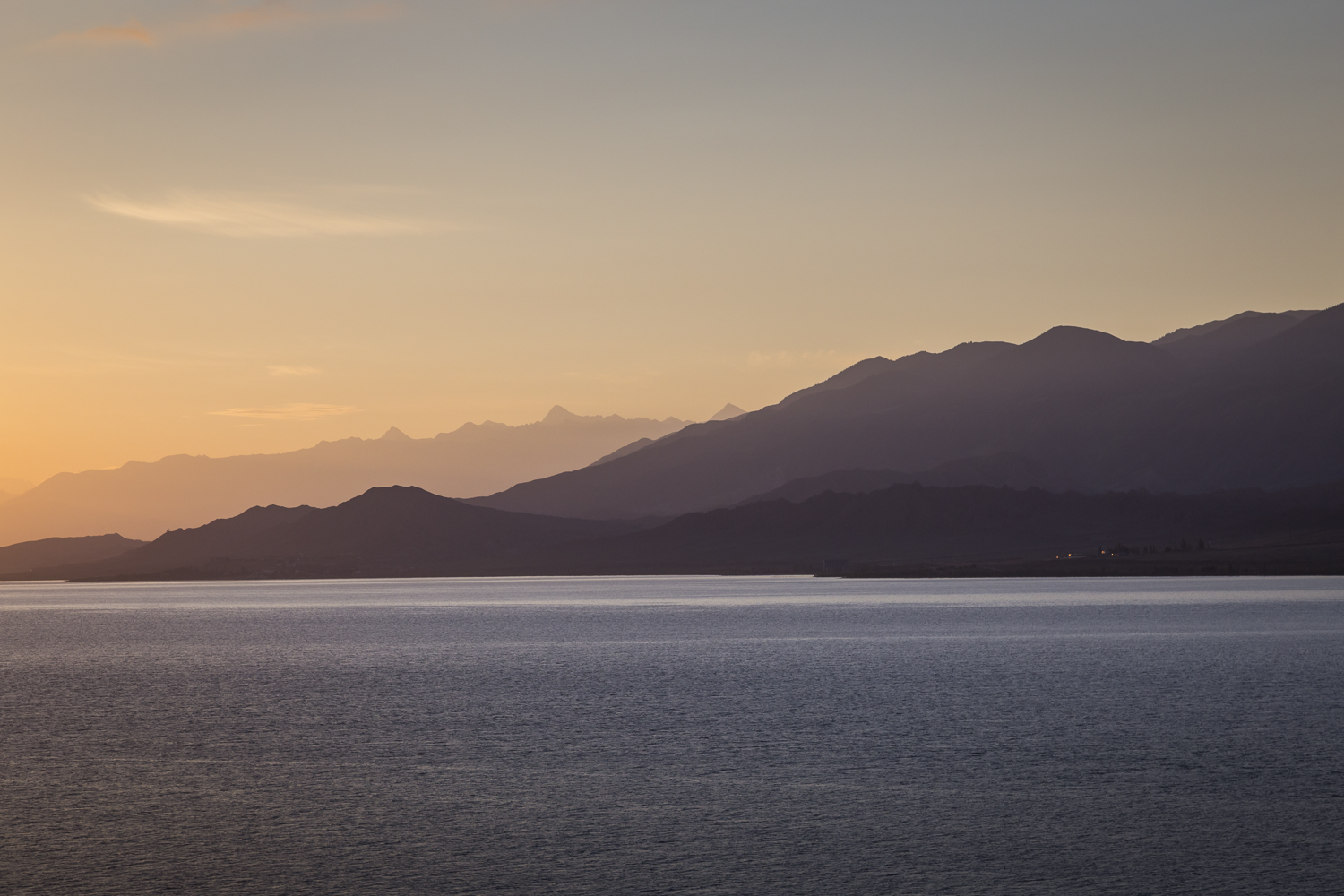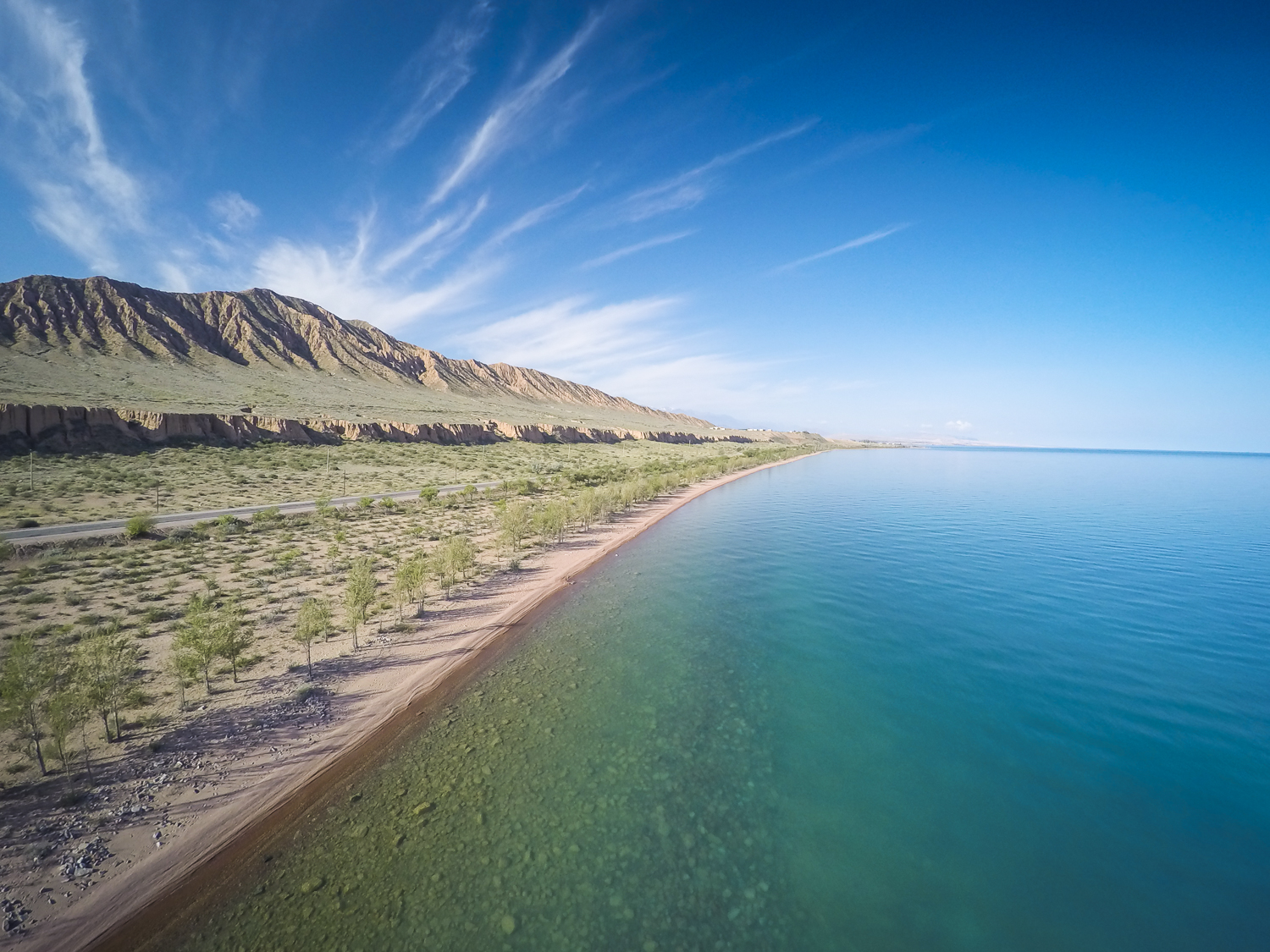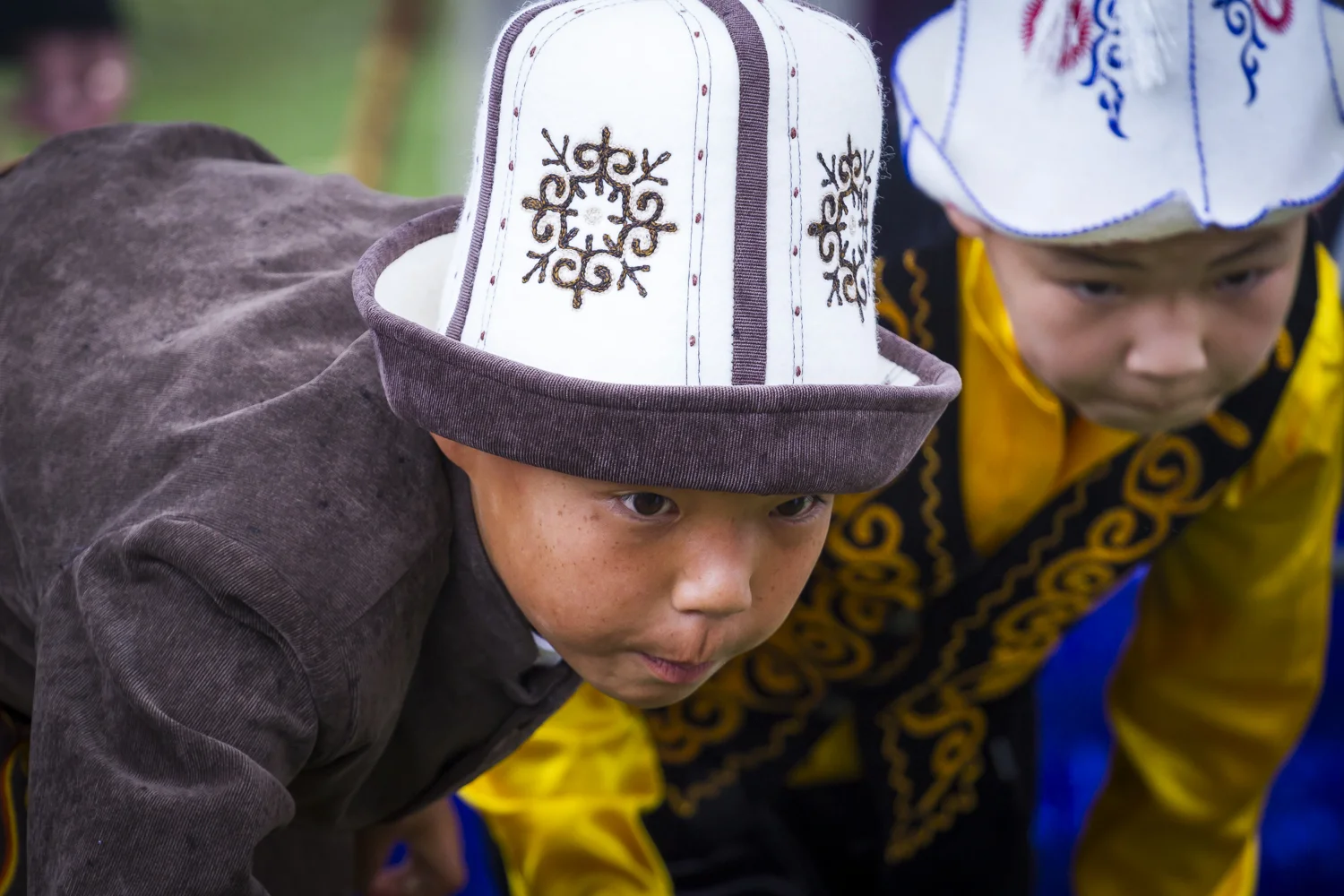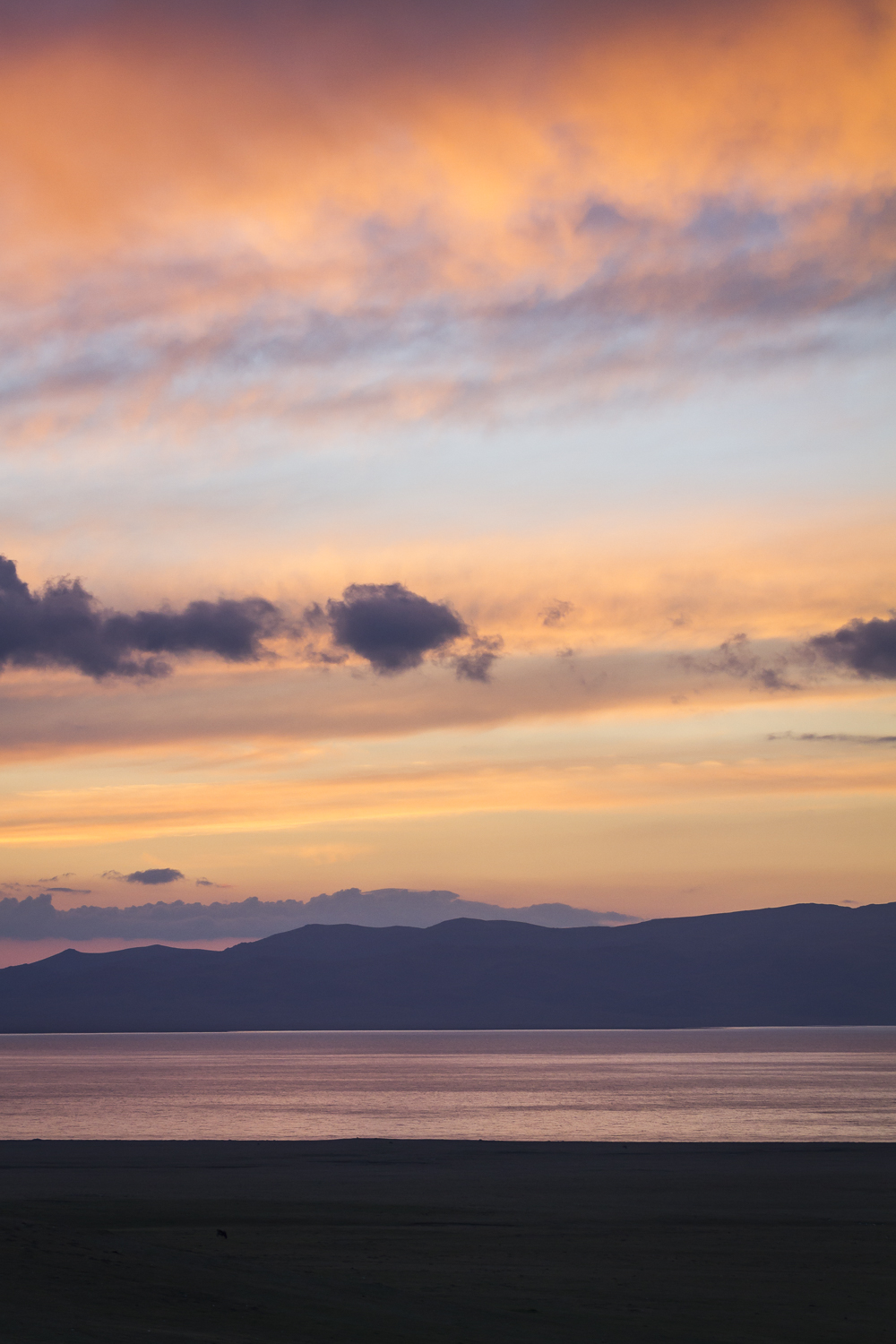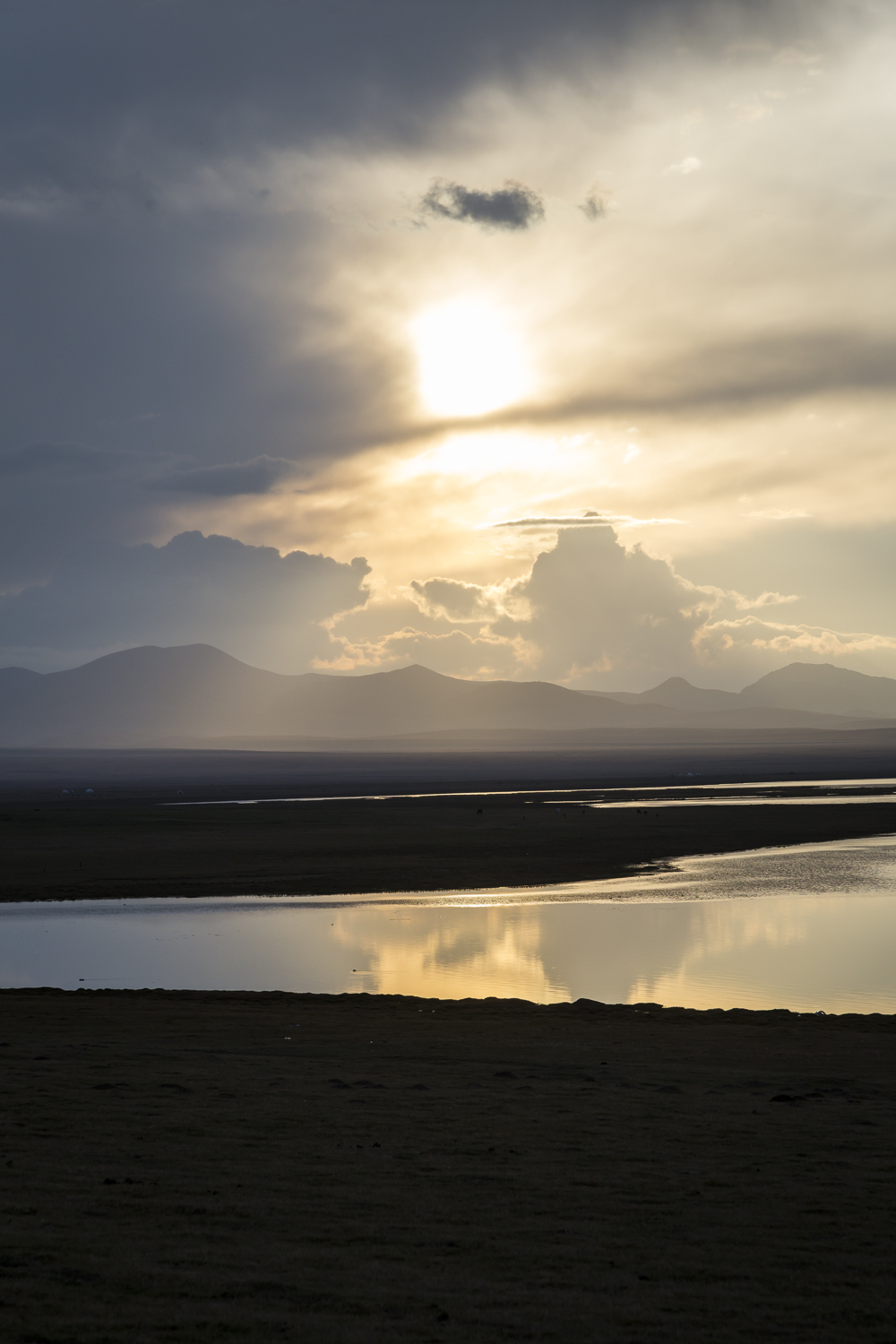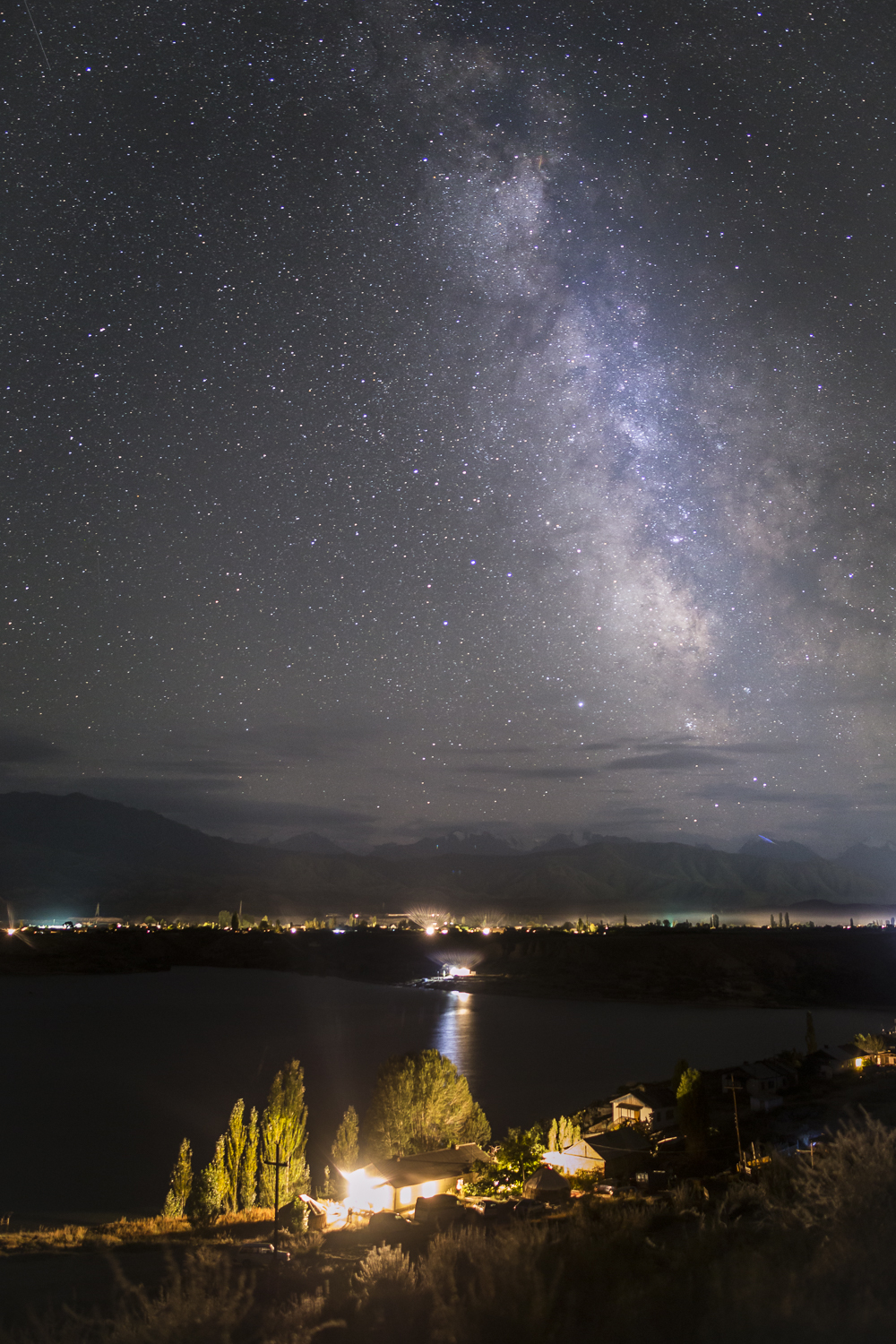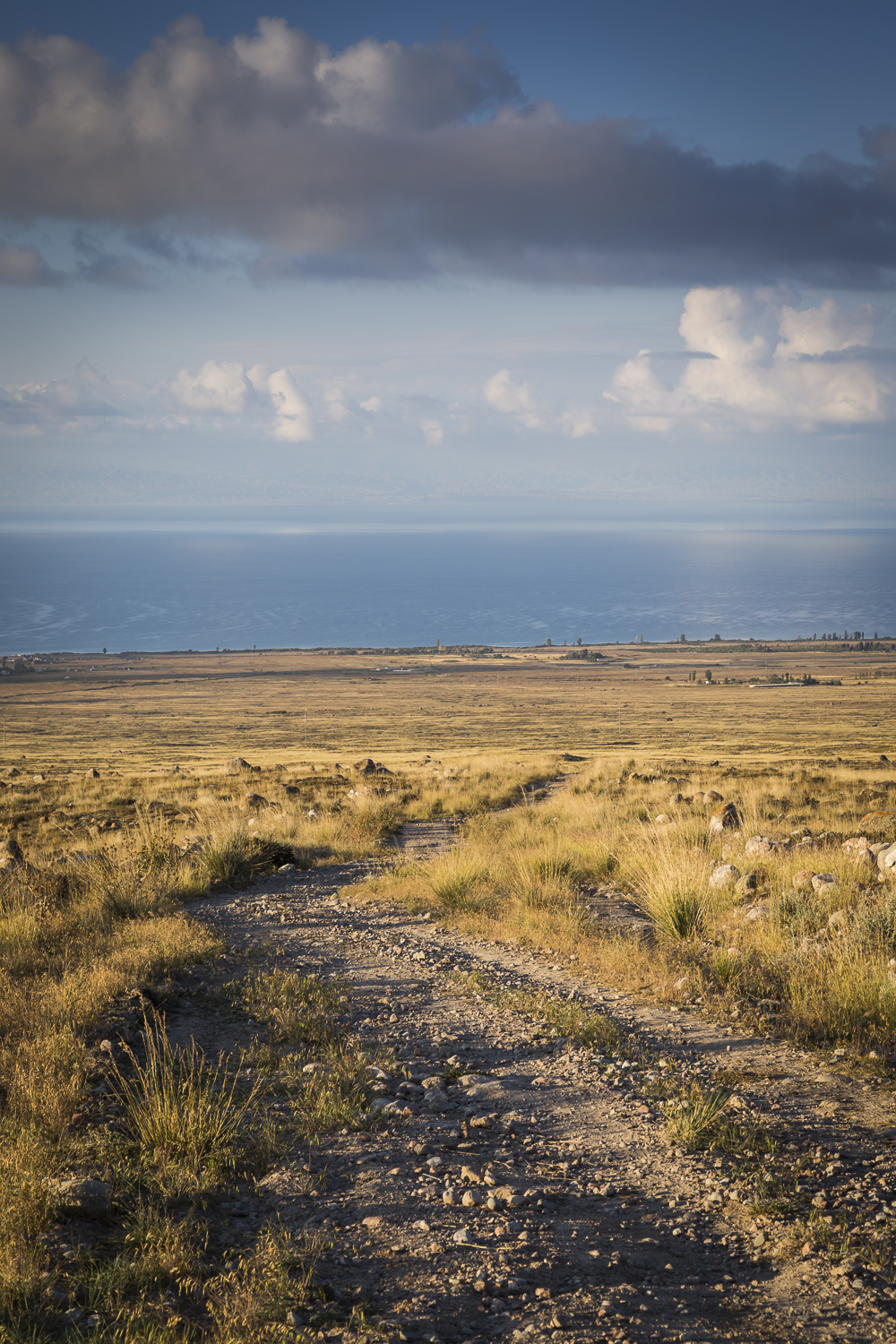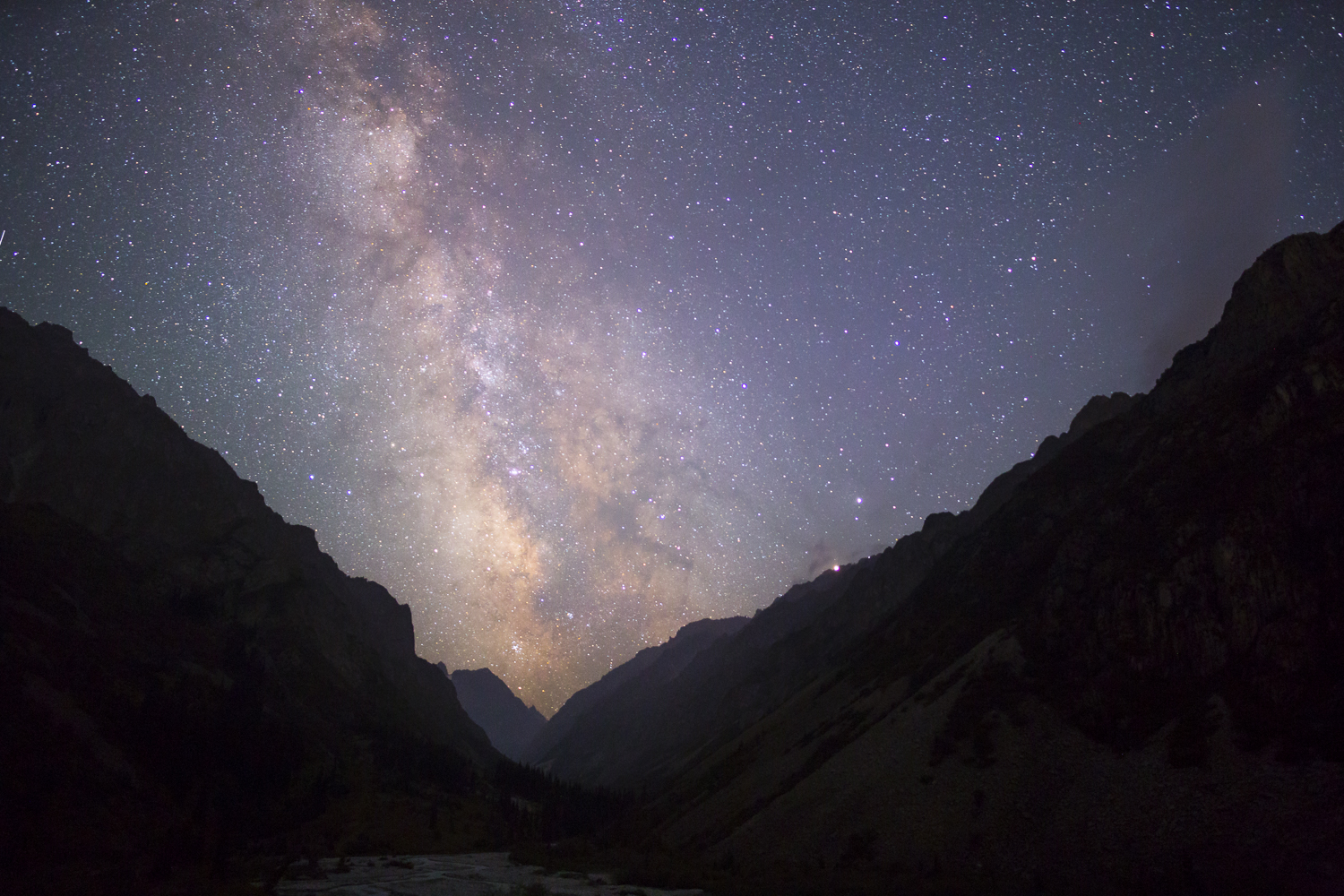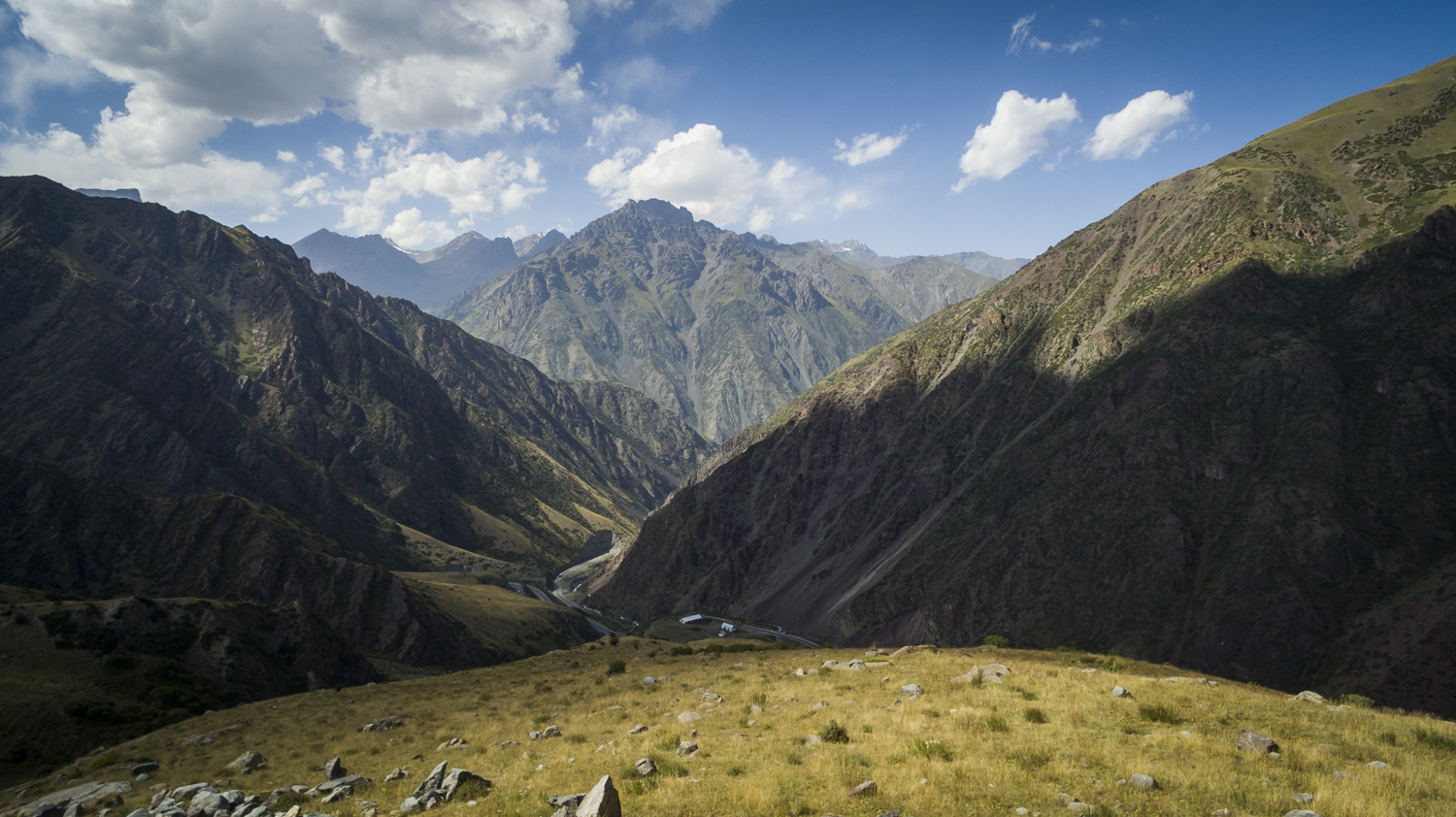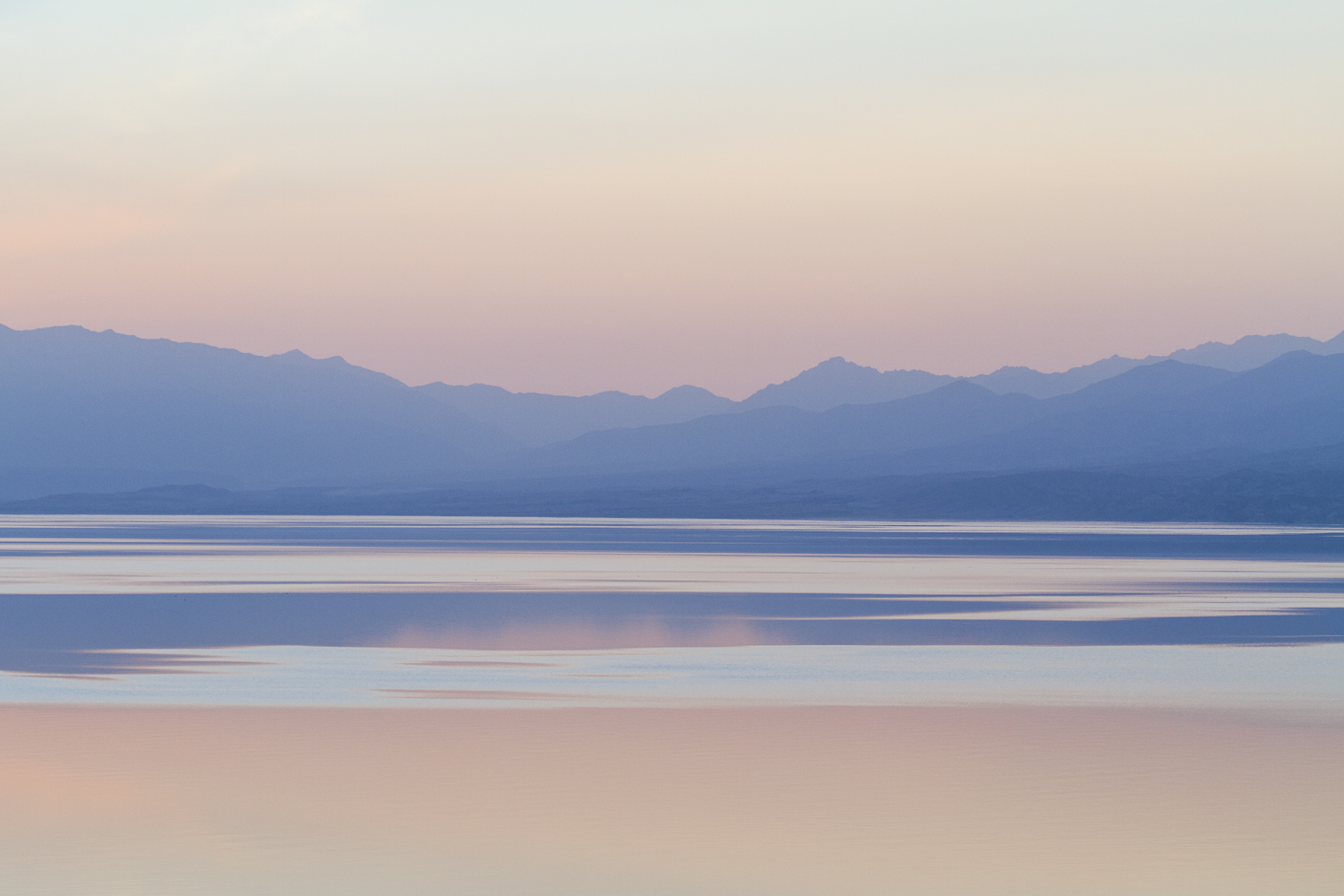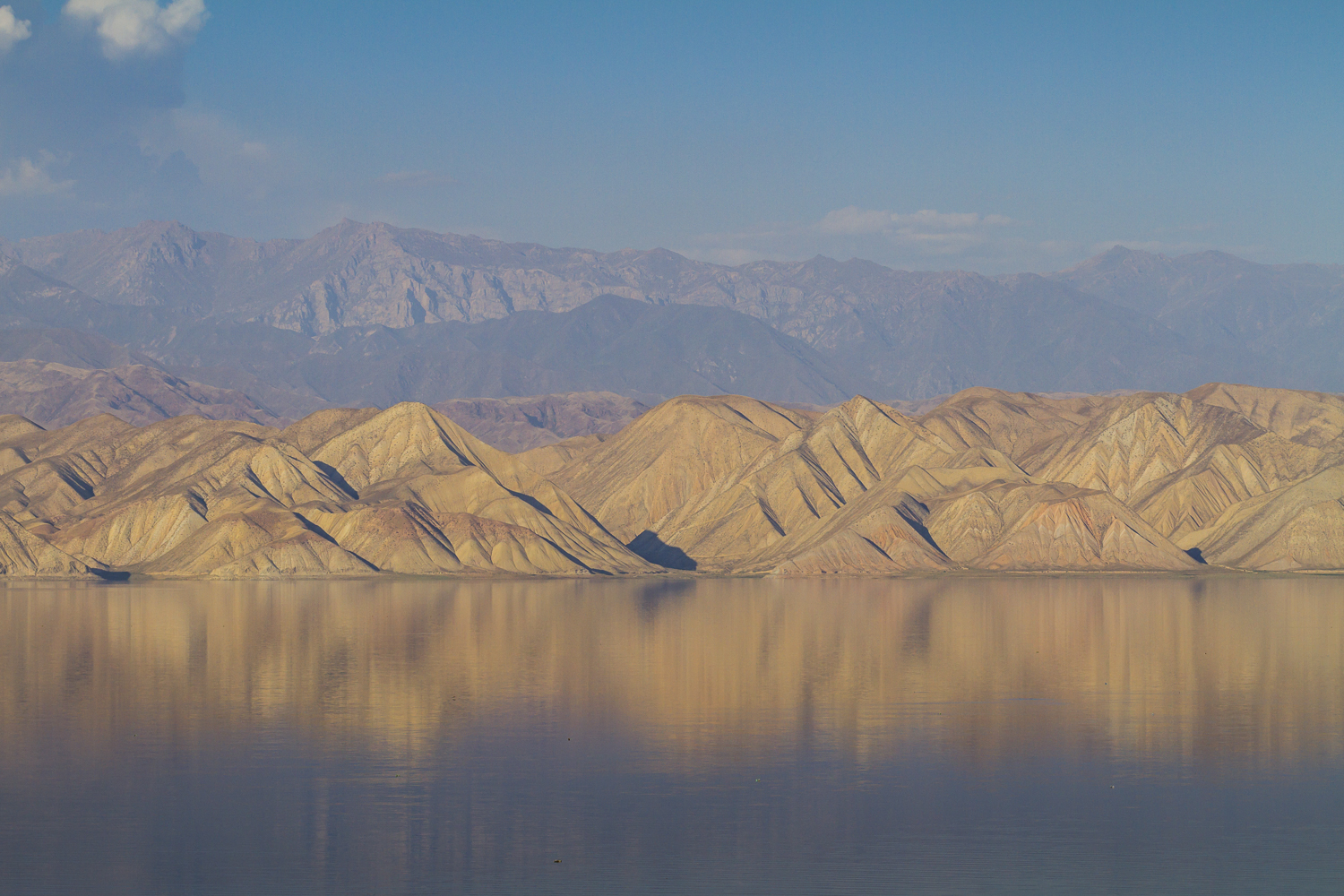A Solo JOURNEY in the heart of central asia
I’ve just finished descending a series of harrowing switchbacks of yet another unnamed pass in this beat-up 4WD Toyota van. I’m happy to be on the valley floor, as there are dark black clouds and lightening in the mountains behind me. I switch my right foot from its position favoring the break pedal to the gas pedal, and to my surprise, the flexing of my ankle invokes no response in the throttle. As I coast to a stop, I instinctively glance in the rear view mirror to make sure no one is behind me. Looking back at the cloud of dust billowing behind my slowing van, I realize that not only is there no one behind me, but it has been since the morning I haven’t passed a single car.
When the van comes to a stop, I decide to give it a quick ‘reboot.’ In this day in age, I’ve had good success with simply stopping and restarting many devices that contain electronics. Maybe it is something erroneous that a restart could resolve. After two tries and still no response, I decide to pop the hood and give it a look over. I’m quickly able to identify the throttle body, and give it a slight turn, which subsequently revs up the engine. Taking a closer look, I see the issue is quite easy to fix: reattach the cable linkage to the gas pedal. That was easy! Within a few minutes, I’m barreling across the valley heading towards yet another set of switchbacks.
Tian Shan landscape in cenrtal Kyrgyzstan
When I was a teenager, I bought my first car for $480: a gray 1986 VW Jetta sedan. It was in a state of repair that demanded it be towed off the owners at the time of purchase. The car and I spent about a month working on sorting out the result of a previous electrical fire that had most of the wires behind the dashboard fused together in a giant mess. My younger brother had developed decent skills with a soldering iron and helped me out. When the vehicle’s main issues were solved, I graduated high school and I drove that car all over the state of NY on various road trips. The car had many other issues, and most of which I was able to sort out myself. I even once replaced the cutch plate, which involved removing the entire transmission. Owning this car was a huge responsibility and the associated steep learning curve mandated a bunch of necessary learning.
By the time the summer had ended, and it was time to go to college, I had acquired a few key tools, knew most of the names of the guys who worked at the local car parts store, and had developed a keen appreciation for road trips. During college, I made a few road summer trips out to California and back, and my fascination for the car-based lifestyle grew. I imagined road trips through far away places like Africa or South America.
Fast forward fourteen years, in the summer of 2016 I was leading an exploratory expedition in a remote corner of the Caucasus mountains in the the Republic of Georgia when I experienced some odd pains in my abdomen. An evacuation and surgery ensued and when I surfaced from the anesthesia, I was recommended by the various doctors to refrain from any heavy lifting for a solid month. This put a serious stop in my original plans of a solo ten day hike around the Ak Su valley of Kyrgyzstan. On the hospital bed, with nothing to do but imagine alternatives, I came up with an idea. Instead of trekking, I could do a road trip where I could still visit remote places, but stay closer to the car. My idea was should I have any difficulties or complications I could simply drive myself to the nearest hospital. The other benefit to this alternative is I would be able to see and experience a larger variety of the country, rather than simply hiking up one valley.
Alpine lake in the Tian Shan
Kyrgyzstan is a country that I first was introduced to through the late alpinist Kyle Dempster and his film "The Road from Karakol." In this epic documentary, Kyle finds all sorts of memorable adventures whilst solo bike packing and climbing mountains. I also read excerpts from the epic adventure of Tommy Caldwell and Beth Roden in the book Over the Edge. After having visited many of the mountain ranges in the world, I still hadn’t visited any of the ranges in Central Asia. I looked into the Pamirs in Tajikistan, the Karakoram in Pakistan and the Altay of Mongolia. Eventually I decided on the Tian-Shan for the visa-free entry and relative ease of access and trailheads.
I landed in Bishkek at day break after a long flight from Istanbul. Standing at the arrivals hall was Sergei, a young Russian man who owns a new rental car agency with an website in English. After a quick inspection of the exterior of the van, I took note that the odometer read over 350,000km. I asked him if it would be possible to remove the big bench seat in the back of the van. I had learned on previous trips that it would be nice to have some shelter if the weather turned really poor, which based on some research It seemed possible it would. He said it wouldn’t be a problem but we would have to go to his house to leave the van seat there. While this isn’t exactly the same quality service as an international rental car chain, Sergei seems like a friendly and honest man. He asked if I would like to drive to his house, but actually, on second though I’d rather he drive. When we get in the van, I only then noticed that the steering wheel is on the right, which seems like a somewhat large oversight on my part in the booking process, as the driving is on the right. Driving in this fashion seems quite dangerous, although I had seen it just weeks before in the Republic of Georgia.
In the twenty minute ride to Sergei’s house, he give some crucial advice and tips for navigating the roads and landscape of Kyrgyzstan. Sergei lets me know there’s a big government sponsored event called the "World Nomad Games" which is happening during some of my last days in country. He also warns me against police corruption, and advises I never give police any money for anything.
After removing the bench seat, I thanked him for the advice and point my rental van towards a grocery store Sergei recommended. My subsequent attempts to navigate the morning traffic of Bishkek result in a few near misses and many honking drives. At the grocery store, I loaded the back of the van up with some basic non - perishable foods. I headed south out of the city towards a nearby national park and the traffic quickly gave way to the foothills of the Tian Shan.
At the trailhead, I packed up a small day pack with a tripod, camera sleeping bag, warm clothes, some snacks and water. After paying a entrance fee, I hiked through up into a narrow beautiful river valley for a few hours. Along the way, I crossed many little steams, saw quite a few variety of wildflowers and got a few glimpses of the glaciers jagged peaks on the skyline. I found a flat spot on the beach of the river and setup camp in the early afternoon. I didn’t bring a tent with me, but the skies looked very clear and I didn’t think it would rain. After eating some snacks and washing my face in a nearby ice-cold stream, I zipped up my sleeping bag and nodded off. What seemed like seconds later, I was stung awake by the sound of my alarm which was set to 1am. I got out of my sleeping bag and made some images of the beautiful and bright stars with the backdrop of the mountains. I went back to sleep feeling like the first day here in Kyrgyzstan was going pretty well.
The following day in the morning, I pointed the car south and had the idea to drive towards Osh, a historically important town on the old silk road. According to my somewhat sketchy maps, the drive could take all day, and I figured I wouldn’t make it all the way. Back down on the plains, nearing the Kazakh border the roads were full of large trucks and the driving was stressful, mostly because I couldn’t get a good sense of where the car ended while sitting in the opposite side of the car I’m used to. Each passing car seemed like it may hit my car. I eventually got used to it, and the traffic lightened as I headed again towards the mountains.
In the next week, what proceeded was a similar flow. During the day, drive up dusty mountain passes, pack up a day back and head out for an overnight camp site less than an hour hike from the car. In this routine, I would spend the afternoon, night and morning making photographs of the fantastic landscape, and during the day, ply the mountain roads in search of good trailheads and places to begin the hikes. I had originally thought to make the trip to Osh in a day or two but it ended up taking more than a week. There were simply too many fantastic places to stop and enjoy along the way.
Kyrgyz kids playing in the Tian Shan
Swing on the edge of the Toktogul Reservoir in central Kyrgyzstan
One day, about a week into the trip, before the climb up onto another high pass, I approached a police checkpoint. The officer signaled for me to pull over. I figured this was a routine stop, so I got out of the car, and handed him my drivers license and the title the car, and to my surprise he asks me to follow him into the office. When we sit down at the office, I’m beginning to become somewhat concerned about why I’m being detained, but my ability to speak neither Kyrgyz or Russian is at equal level with his ability to speak English: non existent. What I can gather from our gesturing is he will not give me back my drivers license, because I seemed to have violated local traffic law. I wasn’t speeding, so I’m not really sure what he’s talking about. Having spent the majority of my adult life in foreign countries, I’ve grown accustomed to this type of interactions. The officer then hands me the phone. A young woman who speaks perfect English identifies herself as a translator for the police service. At first I’m relieved, as I can now find out why I’m being detained, but this feeling soon diminishes when she tells me that I have run a stop sign and that the officer’s confiscation of my drivers license and title of the car will be resolved with a few classes at driving school in Bishkek. First off, I’m not convinced I ran a stop sign at all, and ask her to have the officer point to the sign and hand the officer back the phone. We both go outside, and sure enough, there’s a small stop sign obscured by a huge tree. To further this, now that the one officer is inside, all of the cars are breezing through this checkpoint without stopping. I think back on the moment, and conclude that I was probably following the car in front of me, and didn’t see the sign. I ask the officer for the phone back and explain this to the translator. After a quick summary of my perspective, she seems to have no sympathy and tells me I will have to pay a fine or go to driving school. I think back to what Sergei said, don’t pay the officers any money. She asks to speak to the officer, and I hand the phone back to him. A bit of discussion proceeds and the officer then brings me back into the office and takes out a pair of handcuffs and sets them on the table. With an odd expression on his face, he then takes out a piece of paper and a pen, and writes "2000." I assume he’s talking about money, and I hope he’s talking about Kyrgyz currency. I give him a somewhat confused look, and he then takes out some bills from his pocket, and begins to put them on the table. Then he points at the handcuffs, and then at the pile of bills next to the number 2000. I assume at this point that really, the only way out of here is to pay this fine. At this point I’m relatively certain that all of this "fine" money will end up directly in the officers pocket. I am generally opposed to fueling corruption, looking at the two options on the table, it seems like the easiest way to back to what I was doing prior. I decide to try a bit of negotiation. I write, 1000 on the paper. At first the officer isn’t interested at all, and even walks outside, leaving me in his office and closing the door behind him. Time passes, and eventually I suppose he realizes that I’m not going to loose my patience. We settle on 1500. No receipt is given, no ticket issued, just straight up bonus money for the officer. Feeling a mixture of feelings, mostly of being ripped off, I walk back to my van, and head up to the hills.
About half way through my trip my battery supply was getting low, and my memory cards were getting full. I had heard that there was a successful nation-wide community-based tourism, and thought I would give it a try. In a small town called "Arslanbob" at the base of a series of impressive crags, I found my way into a small family-run guesthouse with a friendly family who spoke plenty of English. I spent a day resting, downloading images and sharing tasty meals with the friendly owners. Spending time with them gave me an interesting insight to this border region which is predominately populated by ethnic Uzbeks. The following day, before heading back out on the road, my hosts and I piled into my van and took a drive around one of the world’s largest walnut groves.
Just a few days before leaving, I headed over to the Issyk-Kul, which is the tenth largest lake in the world. I spent a day driving the perimeter of the lake and stopping to make photographs and a few short hikes. When I approached the lakeside resort town of Cholpon-Ata the traffic began to increase and I followed the long queue of cars up towards the Kazakh frontier into a high alpine valley.
Cresting over a ridge, I saw the temporary settlement which was the World Nomad Games, in full glory. I estimated there were 20,000 people there. I spent my last days in Kyrgyzstan wandering around the festivities and observing many interesting performances and celebrations. There were many white colored yurts set up with representatives from different tribes of Central Asia, including some from neighboring Kazakhstan. The hosts would stand at the door and welcome visitors in to exhibit the interiors. Rugs and other hand made crafts on both the walls and the floors made for a ornate and colorful interior. Some of the hosts spoke English and would explain different traditions they practiced inside. Some of the interiors had feasts setup, others appeared to be religious ceremonies, and others were more like a museum. It was an amazing experience to gain these insights into a fascinating culture.
I ended up staying at the Nomad Games as long as time would allow. I quickly packed by bags and drove the van back towards Bishkek. At the airport, I transitioned quickly from the mindset of this nomadic lifestyle I had for a few weeks to the per-programmed modern calculus of air travel.
On the way home I began to realize that this trip had re-kindled a previous joy I had of traveling in this way. With all I needed in my car: food and camping gear, camera equipment and a map, I enjoyed a sense of freedom and solitude. Reflecting back on my first road trips as a teenager when I had had a similar feeling. In the end, I realized I had been living in a focused and intentional way. Although completely exhausting and nearly obsessive, it was a very inspiring journey and I’m already looking forward to making a similar trip in the near future.



